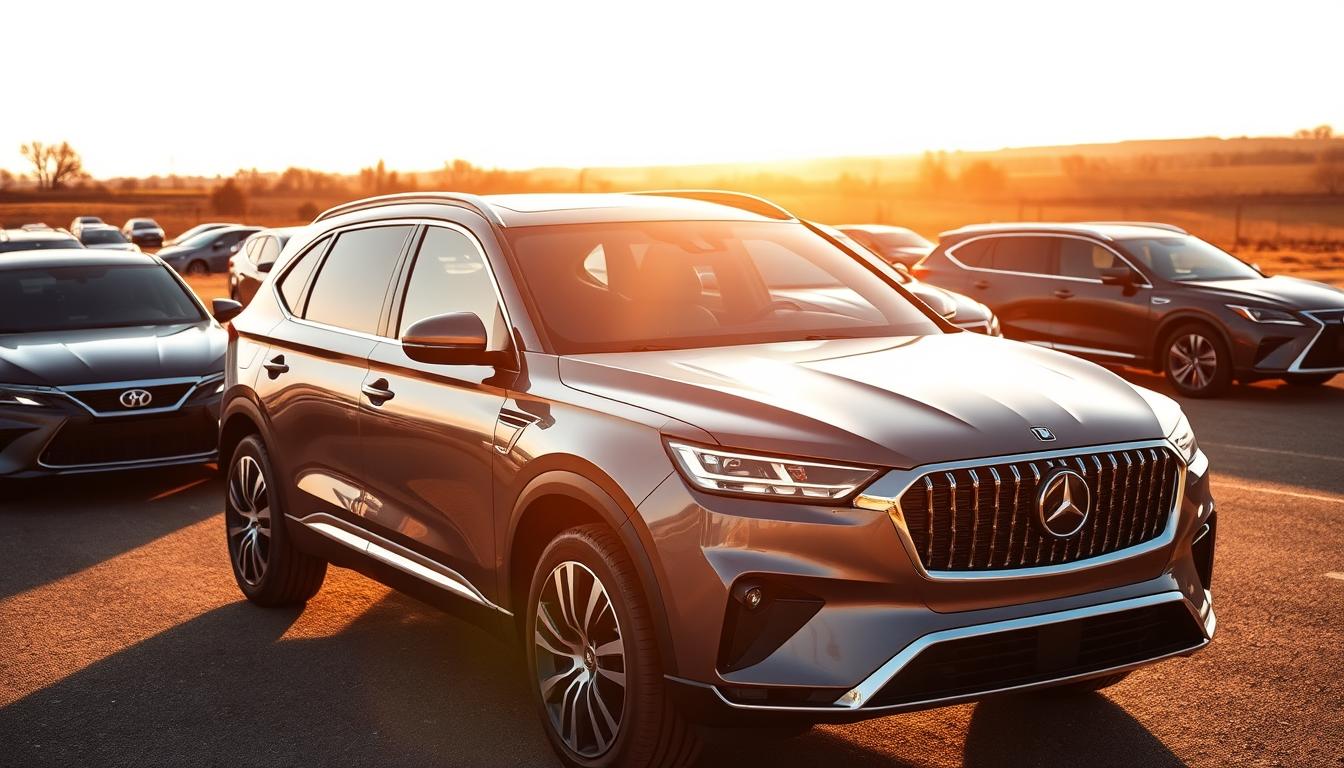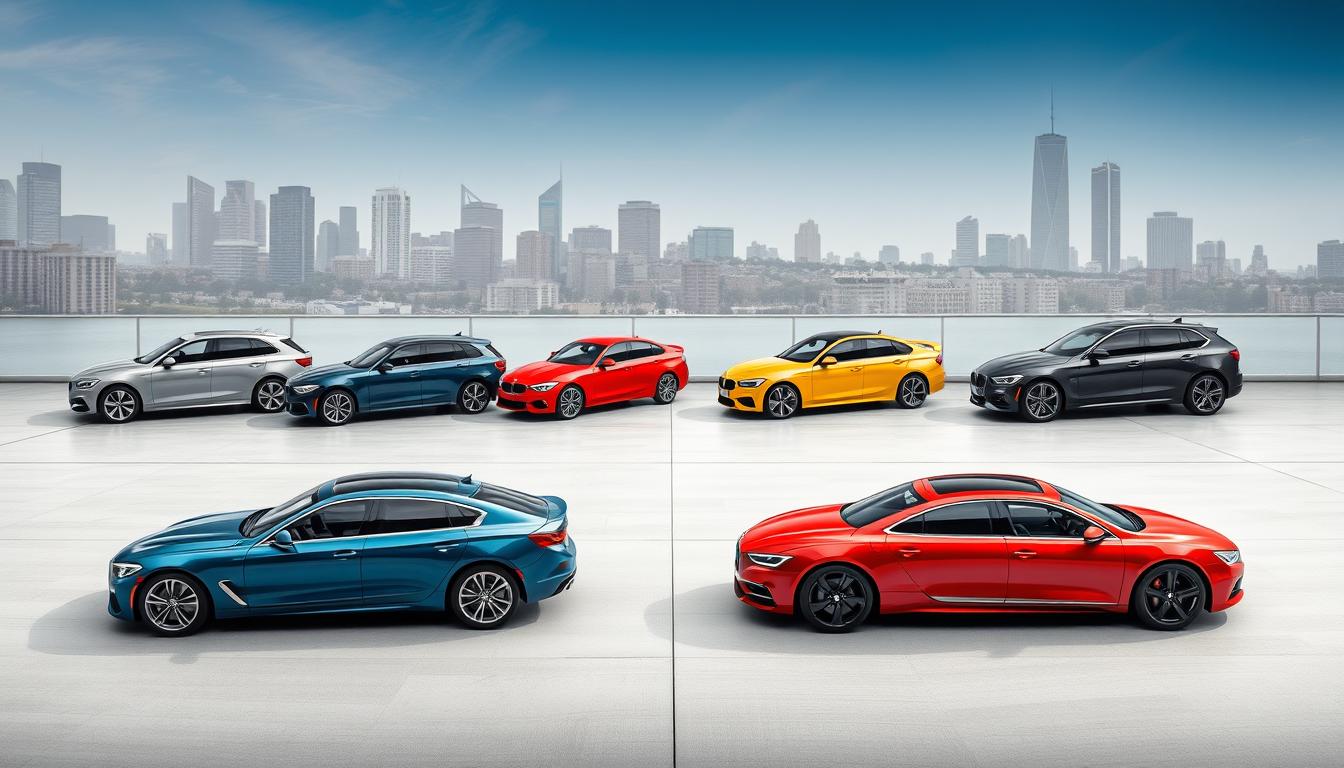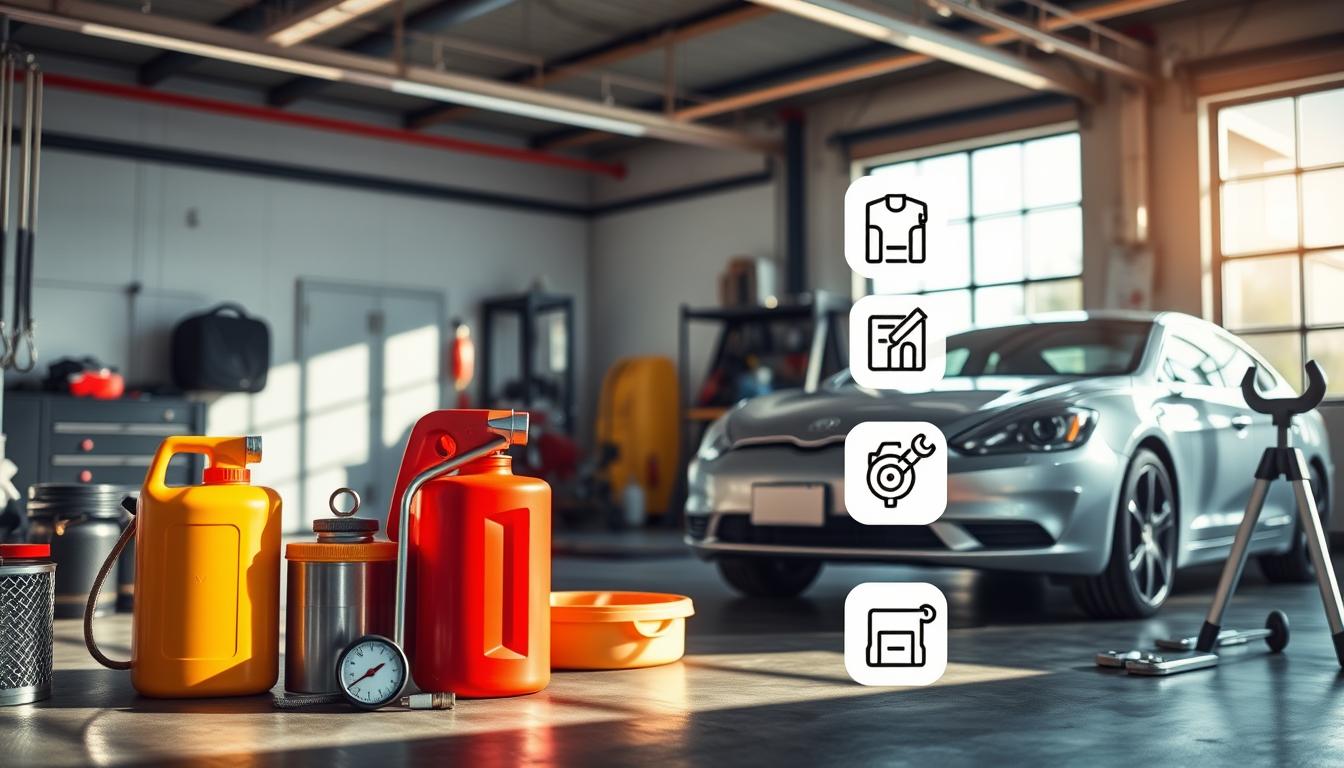The luxury SUV market has seen a significant surge in popularity, with sales projected to grow by over 10% annually in the next few years. This growth is driven by consumers seeking vehicles that offer a blend of comfort, performance, and advanced technology.
As we explore the world of luxury SUVs, we’ll examine the key features that define these premium vehicles, from entry-level models starting around $35,000 to ultra-luxury models exceeding $100,000.
We’ll guide you through the complex landscape of luxury vehicle options, helping you make an informed decision about which model best matches your lifestyle, preferences, and budget.
Key Takeaways
- Understand the defining features of luxury SUVs
- Compare prices across different models and brands
- Discover how different brands approach luxury
- Learn how to choose the best luxury SUV for your needs
- Explore the range of luxury SUV options available
The Evolution of Luxury SUVs in the American Market
As we observe the current automotive landscape, it’s clear that luxury SUVs have become the focal point of the American market, offering a blend of luxury, performance, and versatility. The evolution of these vehicles has been driven by consumer demand for more spacious, technologically advanced, and versatile automobiles.
What Defines a Modern Luxury SUV
A modern luxury SUV is defined by its premium materials, advanced technology features, and exceptional performance capabilities. These vehicles are designed to provide a comfortable and luxurious driving experience, both on and off the road. Luxury SUVs typically come equipped with advanced safety features, premium infotainment systems, and innovative driver assistance technologies.
The interior of a luxury SUV is characterized by the use of high-quality materials, such as leather and wood trim, and features like heated and cooled seats. The exterior design is often bold and sleek, with a strong presence on the road.
The Shift from Sedans to Premium SUVs
Over the past decade, there has been a significant shift in consumer preferences from traditional sedans to premium SUVs. This shift can be attributed to the versatility and practicality offered by SUVs, as well as their perceived safety and status symbol.
| Year | Luxury Sedan Sales | Luxury SUV Sales |
|---|---|---|
| 2015 | 250,000 | 150,000 |
| 2020 | 180,000 | 300,000 |
This trend is expected to continue, with many manufacturers announcing plans to expand their luxury SUV offerings in the coming years.
The Value Proposition of Luxury SUVs
Luxury SUVs offer a compelling value proposition despite their higher price points. The benefits they provide extend beyond basic transportation, including superior materials, build quality, and engineering. Many luxury SUVs come with standard features that would be expensive options on mainstream vehicles, creating better value than the price differential might suggest.
- The ownership experience, including concierge services and extended warranties, adds significant value.
- Luxury SUVs maintain stronger resale values, reducing the total cost of ownership.
- The prestige associated with luxury SUV ownership represents an intangible but real value for many buyers.
When evaluating the value of a luxury SUV, it’s essential to consider not just the initial purchase price, but the overall ownership experience and long-term costs.
Key Factors to Consider When Choosing Your Luxury SUV
As you embark on the journey to own a luxury SUV, it’s essential to consider the key elements that define your driving experience. The luxury SUV market has seen significant advancements, making the selection process both exciting and complex.
To make an informed decision, you need to evaluate several critical factors. These include the vehicle’s performance capabilities, the quality and comfort of its interior, and the level of technology integration.
Performance Metrics That Matter
When it comes to performance, luxury SUVs are expected to deliver exceptional driving dynamics. Key performance metrics include engine power, transmission type, and drivetrain capabilities. For instance, many modern luxury SUVs come equipped with advanced all-wheel-drive systems that enhance traction and stability.
Another crucial aspect is the vehicle’s acceleration and responsiveness. Whether you’re navigating city streets or cruising on the highway, a driver-centric design ensures a more engaging and enjoyable drive.
Interior Quality and Comfort Features
The interior of a luxury SUV is where comfort and craftsmanship come together. High-quality materials, precise build standards, and attention to detail are hallmarks of a superior interior. Features such as heated and ventilated seats, panoramic sunroofs, and premium audio systems contribute to a more comfortable and enjoyable driving experience.
Moreover, the configuration of the cabin, including seating capacity and cargo space, plays a significant role in determining the vehicle’s practicality and versatility.
Technology Integration and Innovation
Technology has revolutionized the luxury SUV experience, with innovations that enhance convenience, safety, and overall driving pleasure. Infotainment systems have become more sophisticated, featuring high-resolution touchscreens, natural voice recognition, and seamless vehicle integration.
Driver assistance technologies have also seen significant advancements, with features like adaptive cruise control, lane-keeping systems, and automated parking becoming standard in many models. These technologies not only improve safety but also reduce driver fatigue on long journeys.
Furthermore, connectivity innovations keep occupants linked to their digital lives, with Wi-Fi hotspots, wireless charging, and dedicated apps for remote vehicle monitoring and control. The integration of technology has transformed the luxury SUV into a mobile command center, where comfort, convenience, and connectivity converge.
Entry-Level Luxury SUVs: $35,000-$45,000 Range
Entry-level luxury SUVs have become increasingly popular, with several models priced between $35,000 and $45,000 offering a compelling blend of luxury and affordability. This price range allows buyers to access premium SUVs with advanced features, without the hefty price tag associated with higher-end models.
Lexus UX: Starting at $37,715
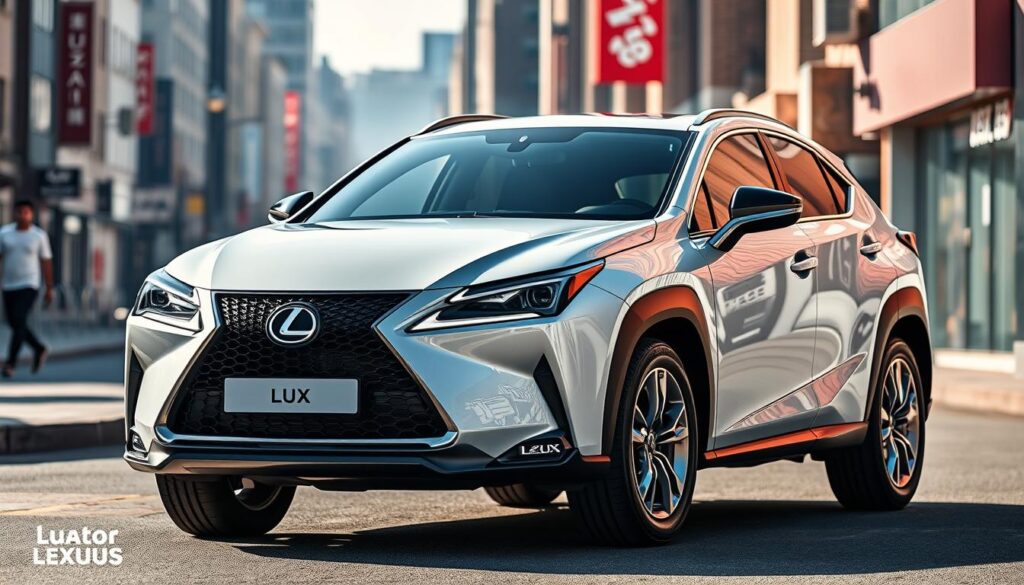
The Lexus UX is a luxury compact SUV that embodies the brand’s commitment to luxury and performance. Starting at $37,715, it offers a compelling package with its sleek design, advanced safety features, and a comfortable interior.
Under the hood, the UX features a 2.0-liter engine that provides a smooth and efficient driving experience. The engine is paired with a continuously variable transmission, ensuring seamless acceleration.
Audi Q3: Starting at $38,695
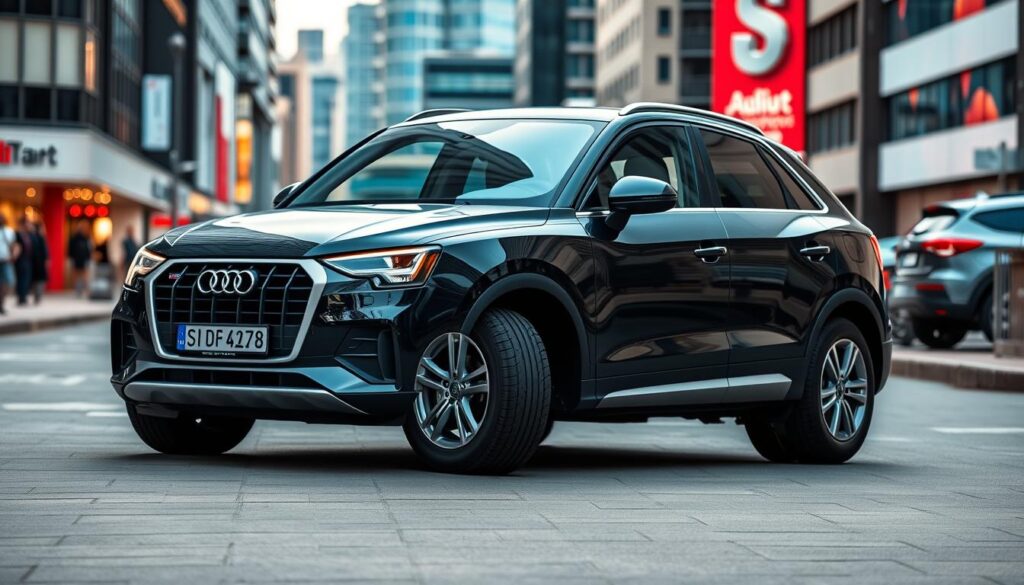
The Audi Q3 is another strong contender in the entry-level luxury SUV segment, starting at $38,695. It boasts a sporty design, a luxury interior, and a range of innovative features that enhance both safety and driving pleasure.
The Q3 is powered by a 2.0-liter turbocharged engine, delivering robust performance and impressive fuel efficiency. Its interior is characterized by premium materials and modern design elements.
Volvo XC40: Starting at $41,945
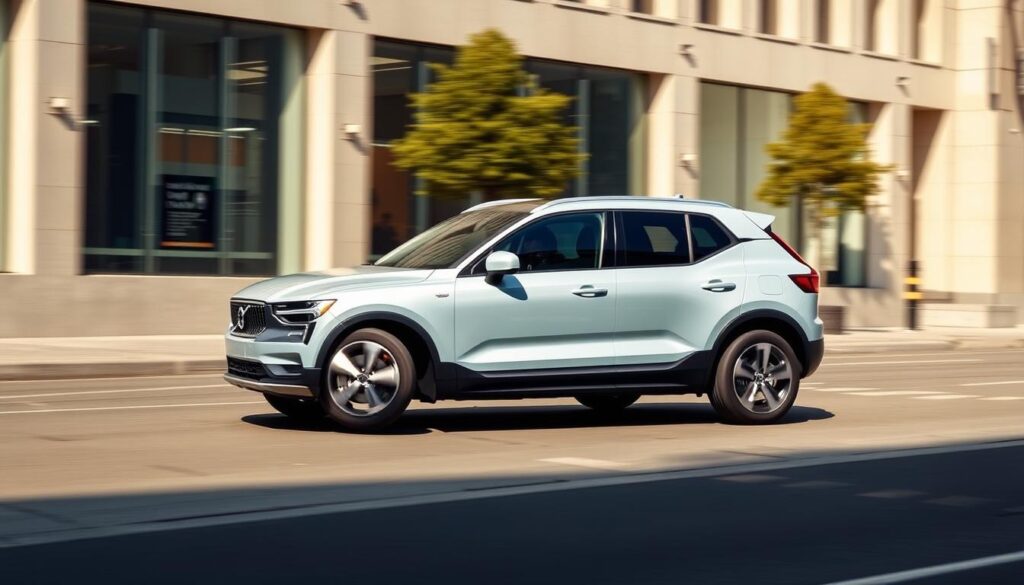
The Volvo XC40 represents Scandinavian luxury at its finest, with a starting price of $41,945. It’s known for its bold design, advanced safety features, and a spacious, comfortable interior.
We’ve analyzed the Volvo XC40 and found it to be a standout model in its class. With a starting MSRP of $41,945 and an average market price of $40,199, buyers can save around $1,746. The XC40 comes equipped with features like a Start/Stop System, Power Trunk/Liftgate, In-Car WiFi, Apple CarPlay, Remote Engine Start, Rear Parking Sensors, Lane Keep Assist, and Front Heated Seats.
The XC40’s engine options balance performance and efficiency, with the base turbocharged powerplant delivering spirited acceleration. The available plug-in hybrid engine offers impressive fuel economy, making it an excellent choice for those looking for a blend of performance and environmental consciousness.
Mid-Range Luxury SUVs: $45,000-$55,000
As the luxury SUV market continues to evolve, the mid-range segment stands out for its blend of performance, luxury, and affordability. This category, spanning from $45,000 to $55,000, offers buyers a diverse selection of premium vehicles that balance high-end features with competitive pricing.
BMW X1 and X2: Starting at $42,525 and $44,025
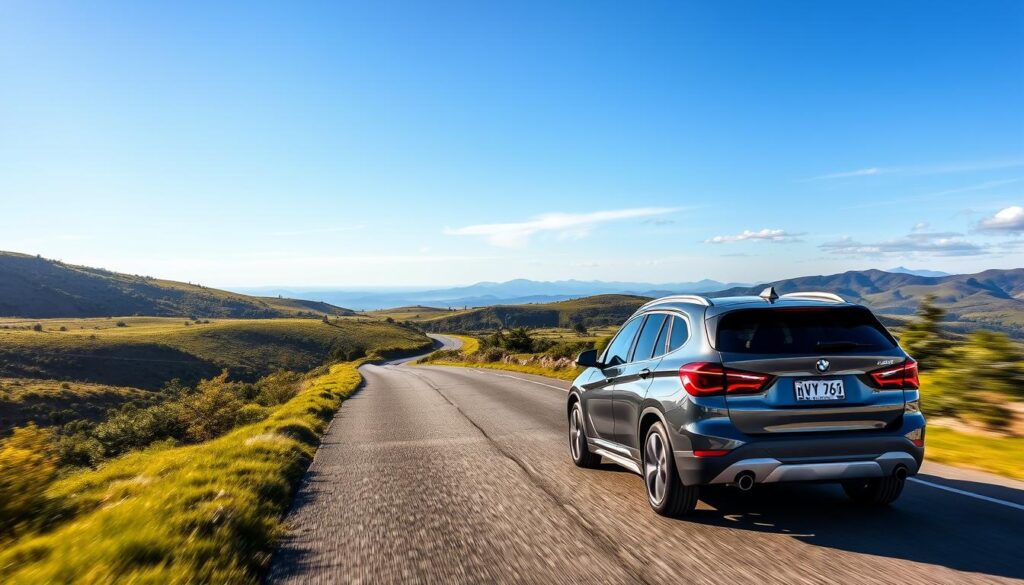
The BMW X1 and X2 are notable entries in the mid-range luxury SUV segment. Both models offer impressive performance and luxurious interiors. The X1 is praised for its spacious cabin and comfortable ride, while the X2 is distinguished by its coupe-like design and agile handling.
Under the hood, both models feature a range of efficient engine options, including turbocharged four-cylinder engines that provide a balance of power and fuel efficiency.
Cadillac XT5: Starting at $45,790
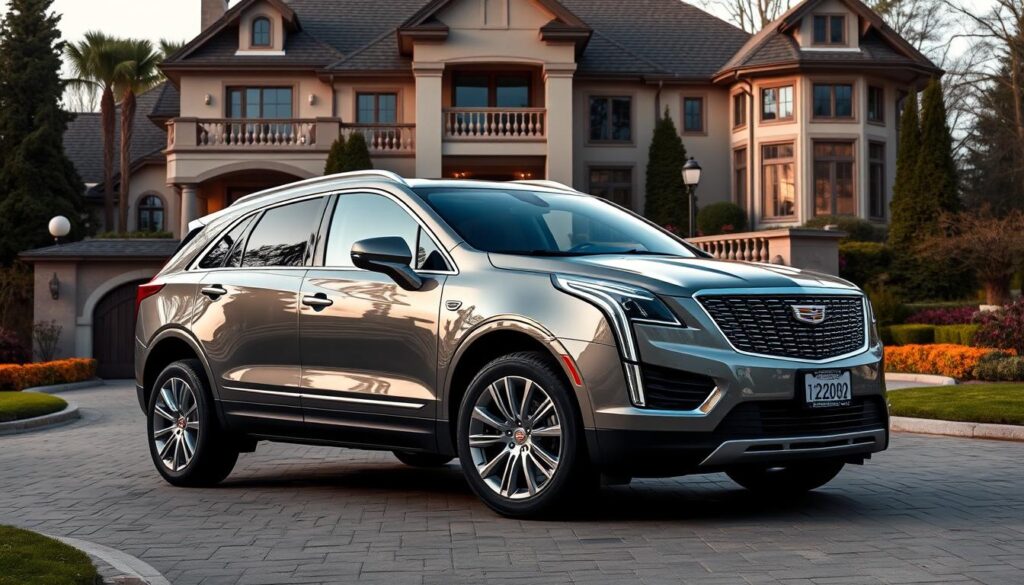
The Cadillac XT5 is another strong contender in this price bracket, offering a luxurious interior and a smooth ride. Its advanced technology features, including an intuitive infotainment system, enhance the driving experience.
The XT5’s engine performance is commendable, with a 3.6-liter V6 engine providing ample power for both daily driving and more spirited adventures.
Audi Q5 and Genesis GV70: Starting at $46,695 and $49,345
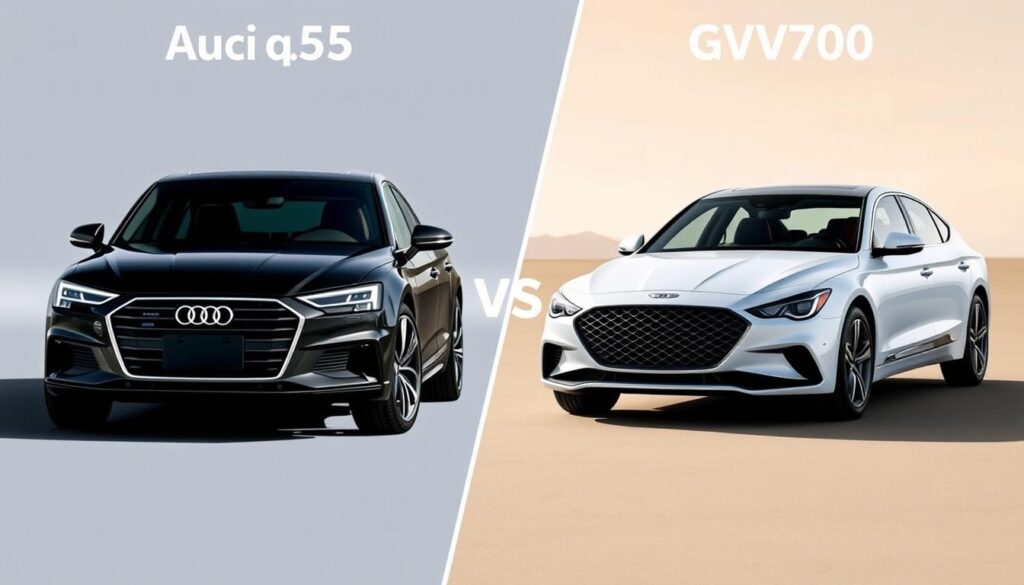
The Audi Q5 and Genesis GV70 represent two of the most compelling options in the mid-range luxury SUV category. The Audi Q5 is renowned for its refined interior and precise build quality, while the Genesis GV70 impresses with its luxurious materials and innovative technology features.
Both models offer strong engine performance, with the Q5 featuring a 2.0-liter turbocharged four-cylinder and the GV70 offering a choice between a four-cylinder and a potent 3.5-liter V6.
The Q5 benefits from Audi’s decades of luxury SUV refinement, while the GV70 brings a fresh design and value-focused luxury to the segment. Notably, the GV70 offers a more generous warranty coverage compared to the Q5, with a 5-year/60,000-mile basic warranty.
Premium Luxury SUVs: $50,000-$75,000
The premium luxury SUV market is where brands push the boundaries of innovation, performance, and opulence. This segment is characterized by vehicles that not only offer superior comfort and technology but also deliver exceptional driving dynamics.
Mercedes-Benz GLC: Starting at $50,400
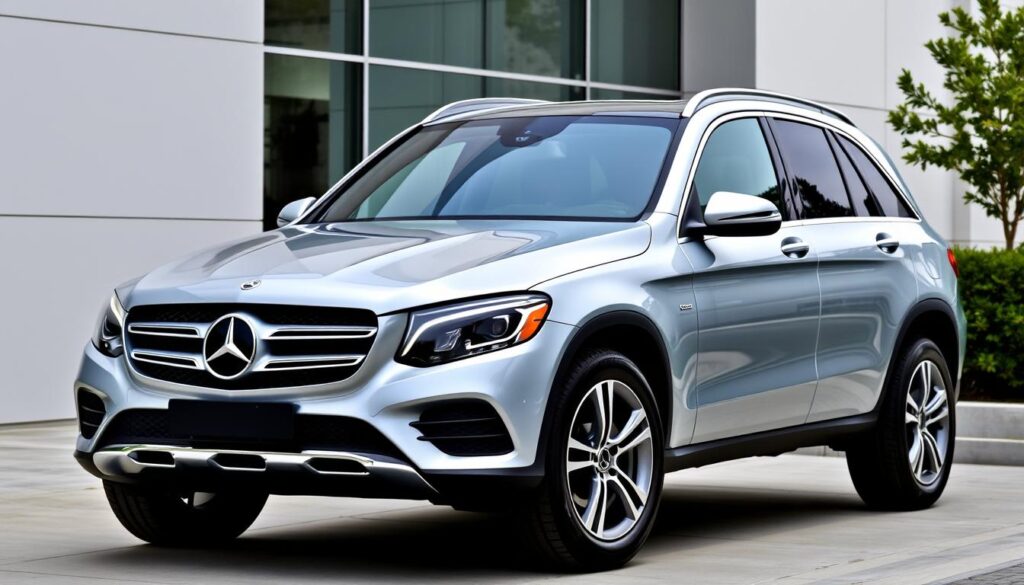
The Mercedes-Benz GLC is a benchmark in the luxury SUV segment, offering a blend of performance, luxury, and technology. With a starting price of $50,400, it is an attractive option for those seeking a premium driving experience. The GLC comes equipped with advanced safety features, a sophisticated infotainment system, and a range of engine options that cater to different driving preferences.
Key Features: Advanced safety features, sophisticated infotainment system, range of engine options.
Cadillac XT6: Starting at $50,690
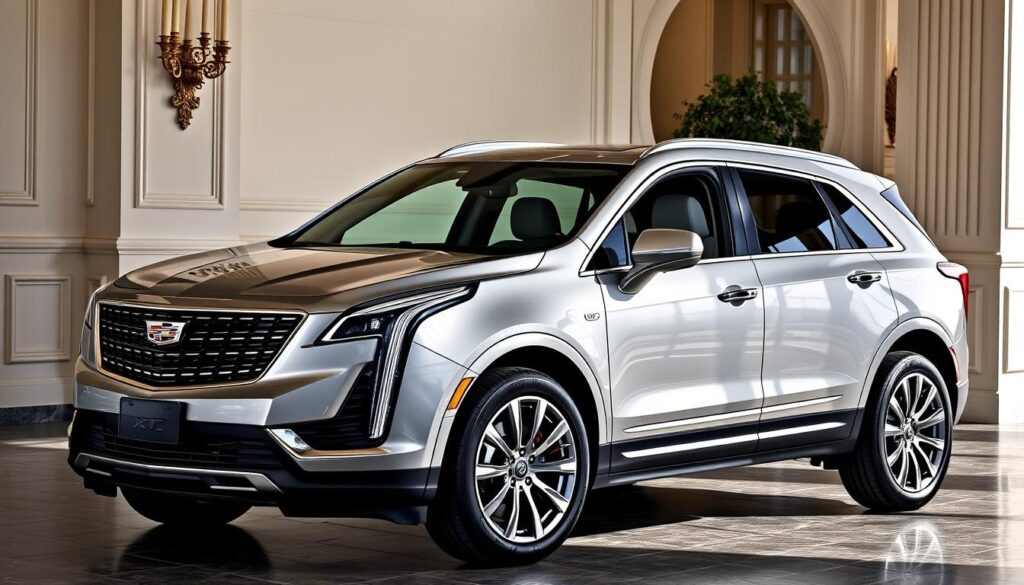
The Cadillac XT6, starting at $50,690, is a testament to Cadillac’s commitment to luxury and performance. It offers a spacious interior, advanced technology, and a comfortable ride. The XT6 is particularly notable for its three-row seating, making it an excellent choice for families or those who need additional passenger space.
Key Features: Three-row seating, advanced technology, comfortable ride.
BMW X5 and Porsche Cayenne
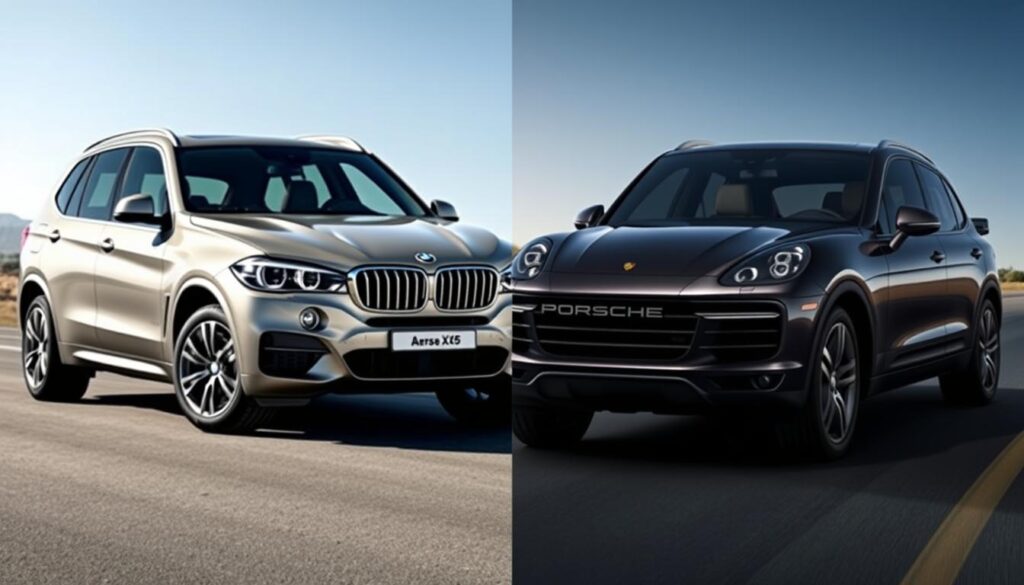
When comparing the BMW X5 and Porsche Cayenne, it’s clear that both vehicles represent different philosophies of premium performance. The BMW X5 offers a balanced approach, blending comfort and capability, while the Porsche Cayenne leans heavily into its sporting character, providing a driving experience that’s hard to match in the luxury SUV segment.
The performance capabilities of both models are exceptional, with powerful engine options ranging from efficient six-cylinders to thunderous V8s. The handling characteristics of each brand showcase their DNA, with the X5 providing an excellent balance and the Cayenne offering a sports-car-like driving experience.
Engine technology is at the forefront in both models, with sophisticated turbocharging, hybrid options, and performance-oriented variants. The Porsche Cayenne has redefined expectations for SUV handling precision, with steering feel and chassis response that defy the laws of physics for vehicles of this size.
Both models command premium prices, starting in the $60,000 range but can quickly escalate past $100,000 with options and performance upgrades.
Ultra-Luxury and Performance SUVs
The world of luxury SUVs has expanded to include ultra-luxury and performance variants that redefine the boundaries of automotive excellence. These vehicles are not just about getting from point A to point B; they’re about delivering an extraordinary driving experience that combines luxury and performance in a way that’s hard to match.
Range Rover and Range Rover Sport
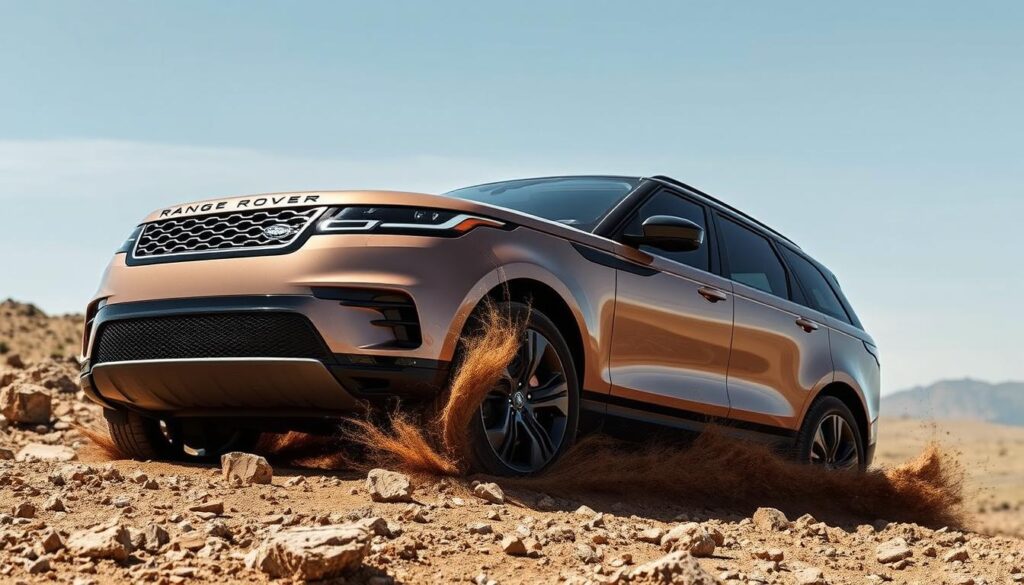
The Range Rover and Range Rover Sport are epitomes of luxury and capability. With their powerful engine options and advanced handling systems, they offer a driving experience that’s both refined and adventurous. The Range Rover Sport, in particular, is known for its dynamic handling and robust engine performance.
Porsche Cayenne and Macan Performance Variants
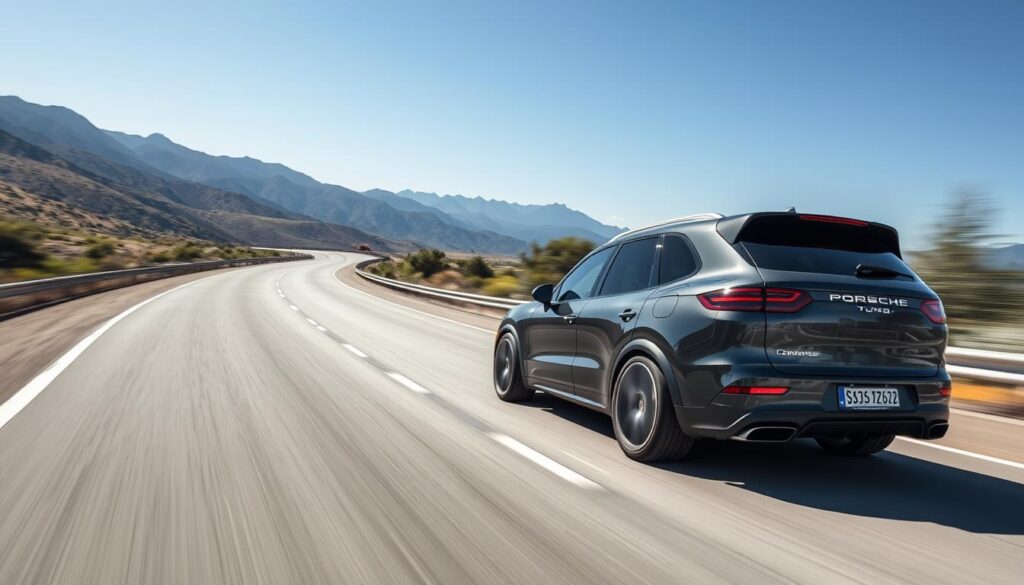
Porsche’s foray into the luxury SUV segment has been highly successful, with the Cayenne and Macan offering a unique blend of performance and practicality. The performance variants of these models, such as the Cayenne Turbo, boast impressive acceleration and agile handling, making them a favorite among driving enthusiasts.
Exotic SUVs: Aston Martin DBX, Ferrari Purosangue, and Lamborghini Urus
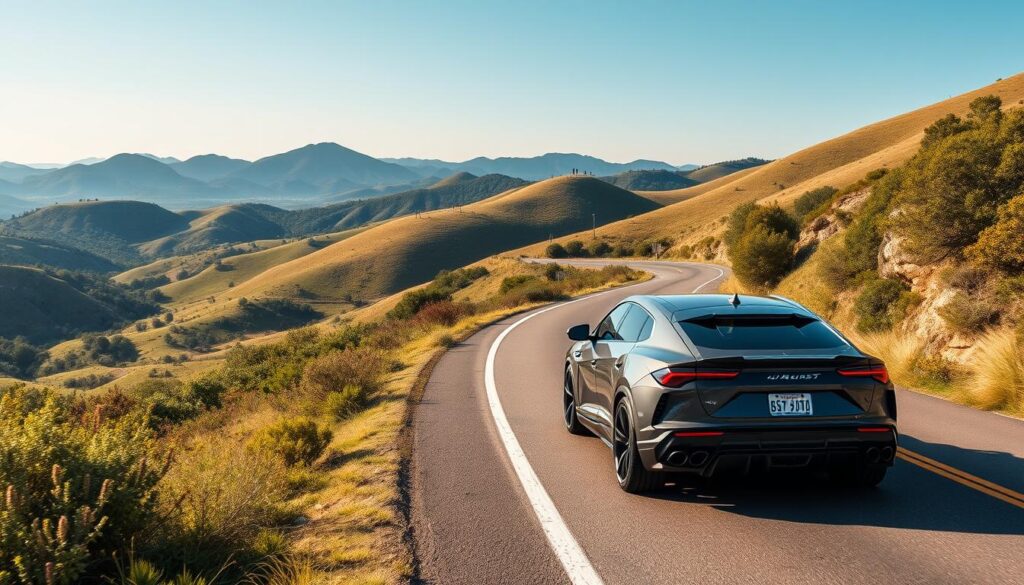
The emergence of exotic SUVs has brought a new level of excitement to the luxury SUV market. Models like the Aston Martin DBX, Ferrari Purosangue, and Lamborghini Urus are redefining what’s possible in terms of engine performance and driving experience. The Lamborghini Urus, with its twin-turbo V8 engine, is a standout example, offering supercar-like acceleration in a practical SUV package.
These ultra-luxury and performance SUVs are not just about raw power; they’re also about delivering a luxurious experience. From the hand-crafted interiors of the Aston Martin DBX to the exclusive design of the Ferrari Purosangue, each of these vehicles offers a unique blend of luxury and performance that’s hard to find elsewhere.
Ride Quality and Comfort: The Luxury SUV Experience
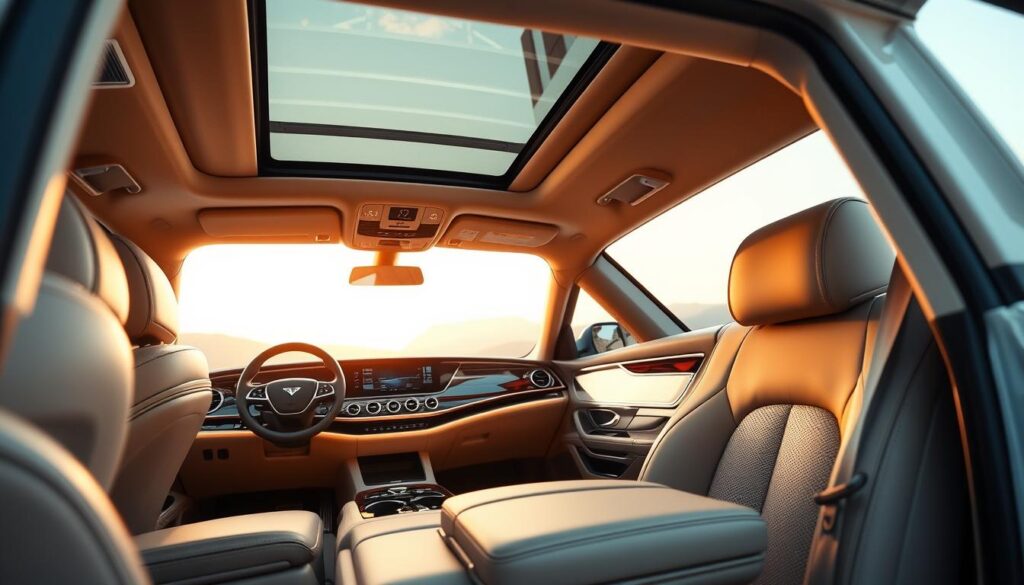
A luxury SUV’s true value is measured by its ride quality and interior comfort. When evaluating these vehicles, we look beyond their exterior design and performance capabilities to understand how they deliver on the promise of luxury.
The luxury SUV segment has evolved significantly, with manufacturers now focusing on creating vehicles that not only look premium but also provide an exceptional driving and riding experience. This involves a deep dive into various aspects, including suspension systems, cabin noise levels, and seating comfort.
Suspension Systems and Road Isolation
The suspension system plays a crucial role in determining the ride quality of a luxury SUV. Advanced systems, such as adaptive air suspension and magnetic ride control, are designed to absorb road imperfections, providing a smooth ride even on rough terrain.
Key Features of Advanced Suspension Systems:
- Adaptive damping that adjusts to road conditions
- Air suspension that can lower the vehicle for easier entry and exit
- Electronic control units that continuously monitor and adjust the suspension
These features not only enhance comfort but also improve handling and stability, making the vehicle more responsive to driver inputs.
Cabin Noise Levels and Acoustic Comfort
Cabin noise levels are another critical factor in the overall comfort of a luxury SUV. Manufacturers employ various techniques to minimize noise intrusion, including sound-absorbing materials, acoustic glass, and active noise control systems.
Effective noise reduction strategies include:
- Using sound-absorbing materials in the cabin
- Implementing active noise control technology
- Designing the vehicle with aerodynamic efficiency in mind
These measures contribute to a quieter cabin, enhancing the overall driving experience and passenger comfort.
Seating Comfort and Passenger Space
Seating comfort is paramount in luxury SUVs, with many models offering advanced features such as heated and ventilated seats, massage functions, and adjustable bolsters. The quality of the seating materials, such as semi-aniline leather, also plays a significant role in the perceived luxury of the vehicle.
Aspects of Seating Comfort:
- Adjustment range and support characteristics
- Material quality and durability
- Additional features like massage and ventilation
We’ve found that the finest luxury SUVs offer spacious interiors, with ample legroom and cargo space, making them ideal for both daily driving and long road trips.
The attention to detail in luxury SUVs extends to the interior space, where the utilization of space can vary significantly between models. Some prioritize front-seat occupants, while others offer more equitable accommodations for all passengers.
Interior Quality and Craftsmanship
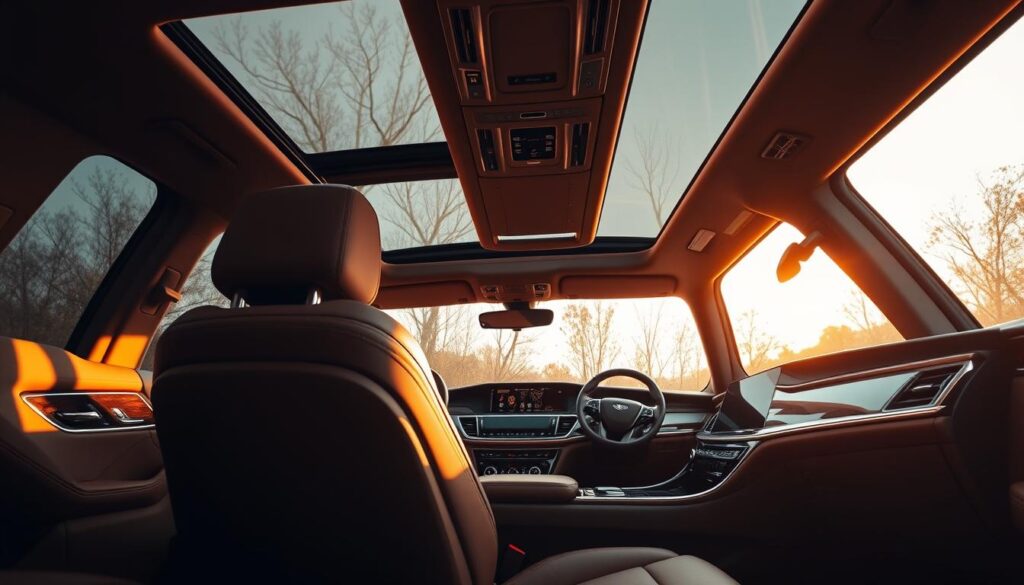
As we explore the world of luxury SUVs, it becomes clear that the interior quality and craftsmanship are just as important as the vehicle’s capabilities on the road. The interior of a luxury SUV is a sanctuary of comfort, technology, and design, reflecting the brand’s commitment to excellence.
Premium Materials and Build Standards
Luxury SUVs are distinguished by their use of premium materials and exceptional build standards. Manufacturers employ a range of materials, from supple leathers to rich woods and metallic accents, to create an atmosphere of opulence. The attention to detail is evident in the stitching, the fit of the trim, and the overall feel of solidity.
For instance, brands like Bentley and Rolls-Royce are renowned for their meticulous approach to interior craftsmanship, using materials that are both durable and aesthetically pleasing. The use of such materials not only enhances the driving experience but also contributes to the vehicle’s long-term value.
Interior Design Philosophy by Brand
Each luxury brand brings its unique design philosophy to the interior of its SUVs. Some, like Audi, emphasize a modern, minimalist aesthetic, while others, such as Cadillac, incorporate bold design elements and cutting-edge technology. Understanding these philosophies can help buyers choose a vehicle that aligns with their personal style.
The design philosophy also influences the layout and functionality of the interior. For example, some brands prioritize driver-centric designs, while others focus on creating a communal space for all occupants. This diversity allows buyers to select a luxury SUV that meets their specific needs and preferences.
Customization Options and Packages
Luxury SUV buyers increasingly seek personalization, driving manufacturers to offer expanded customization options. These range from simple color and trim selections to fully bespoke programs where nearly every surface can be specified to the buyer’s preference. We’ve observed significant differences in the depth and breadth of personalization options across brands.
- Ultra-luxury brands like Bentley and Rolls-Royce offer the most extensive customization programs, allowing buyers to specify unique colors, materials, and features.
- Mainstream luxury brands now offer “designo” or “Individual” programs that provide greater personalization options for discerning buyers.
- The model year can significantly impact available options, with manufacturers adjusting package content and availability based on supply chain considerations and consumer trends.
By understanding the available customization options and packages, buyers can tailor their luxury SUV to their exact specifications, ensuring a truly unique driving experience.
Technology Features That Define Modern Luxury SUVs
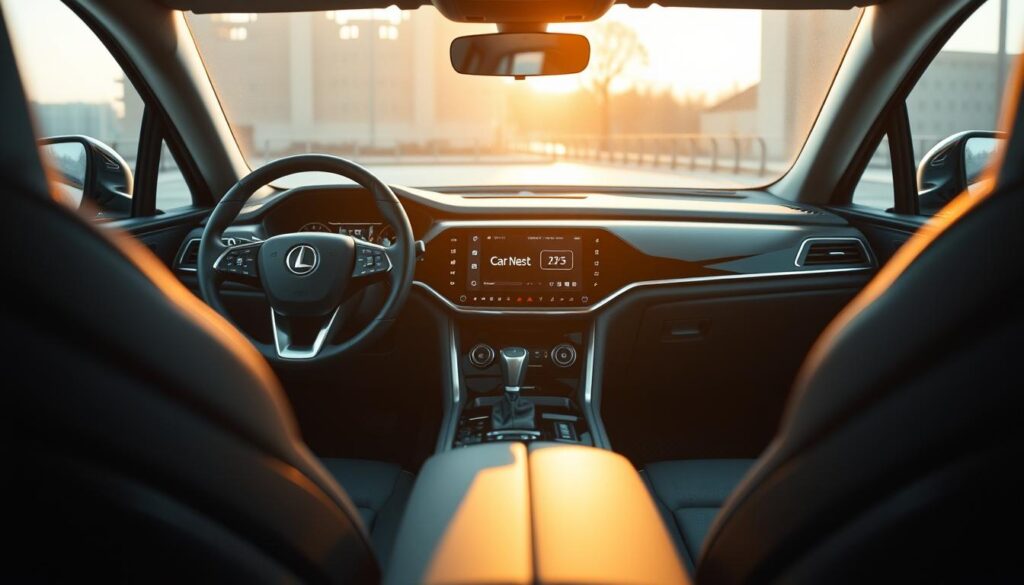
As we explore the world of luxury SUVs, it becomes evident that technology plays a pivotal role in shaping the premium experience. The integration of advanced technology has transformed these vehicles into sophisticated machines that offer more than just transportation.
Advanced Infotainment Systems
Luxury SUVs now boast advanced infotainment systems that are both intuitive and feature-rich. These systems often include high-resolution touchscreens, voice recognition, and seamless smartphone integration through technologies like Apple CarPlay and Android Auto. “The infotainment system is the heart of the modern luxury SUV, providing drivers with access to a wide range of functions and information at their fingertips,” says an industry expert.
We’ve observed that the most effective infotainment systems are those that balance functionality with simplicity, ensuring that drivers can access the information they need without being distracted from the road. Some luxury SUVs take this a step further by offering customizable user profiles, allowing multiple drivers to personalize their experience.
Driver Assistance and Safety Technology
Driver assistance and safety technology have become critical components of modern luxury SUVs. Features such as adaptive cruise control, lane-keeping assist, and automatic emergency braking are now commonplace. These technologies not only enhance safety but also contribute to a more relaxed driving experience.
The use of advanced driver-assistance systems (ADAS) is becoming increasingly prevalent, with some luxury SUVs offering semi-autonomous driving capabilities. This technology enables vehicles to take control in certain situations, such as heavy traffic or during long highway journeys, further enhancing safety and comfort.
Key safety features include:
- Adaptive cruise control
- Lane-keeping assist
- Automatic emergency braking
- Blind-spot monitoring
Connectivity and Smart Integration
Connectivity has become a cornerstone of the luxury SUV experience. Modern vehicles are designed to integrate seamlessly with the driver’s digital ecosystem, offering features such as remote vehicle monitoring and control through dedicated apps. This allows owners to check their vehicle’s status, lock or unlock doors, and even start the climate control system remotely.
Some luxury SUVs also offer smart home integration, allowing owners to control certain vehicle functions through home automation platforms like Amazon Alexa and Google Home. The most advanced models are now incorporating vehicle-to-everything (V2X) communication, enabling the vehicle to communicate with infrastructure and other vehicles to enhance safety and efficiency.
“The future of luxury SUVs lies in their ability to integrate with our digital lives, providing a seamless and connected experience that goes beyond just driving.” – Industry Expert
As technology continues to evolve, we can expect luxury SUVs to become even more sophisticated, offering enhanced connectivity, safety, and convenience features that redefine the premium driving experience.
Hybrid and Electric Luxury SUV Market
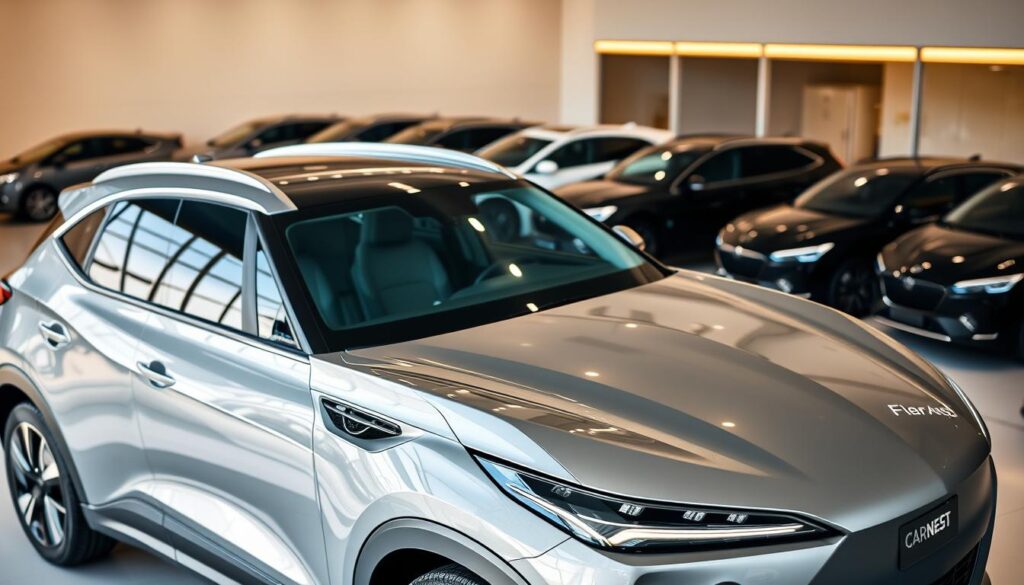
The automotive industry’s move towards electrification is prominently reflected in the luxury SUV segment, with manufacturers investing heavily in hybrid and electric technology. This shift is not only driven by regulatory pressures but also by consumer preferences for vehicles that offer both performance and environmental sustainability.
Plug-in Hybrid Models: Performance and Efficiency
Plug-in hybrid luxury SUVs are gaining popularity as they offer the best of both worlds: the efficiency of electric driving and the range flexibility of a combustion engine. Models like the BMW X5 xDrive45e and Audi Q5 TFSI e are leading the charge, providing consumers with improved fuel efficiency without compromising on performance.
- Reduced emissions through increased use of electric power
- Enhanced performance due to the combined power of electric and combustion engines
- Flexibility in fueling options, reducing range anxiety
As plug-in hybrid technology continues to evolve, we can expect to see improvements in electric range and charging capabilities, making these vehicles even more appealing to luxury SUV buyers.
All-Electric Luxury SUVs: Range and Charging
All-electric luxury SUVs are becoming increasingly viable, with advancements in battery technology leading to significant improvements in range. Vehicles like the Tesla Model X and Jaguar I-PACE offer miles electric ranges that are competitive with their combustion-engine counterparts.
- Extended ranges of over 300 miles on a single charge
- Rapid charging capabilities that can replenish the battery to 80% in under 30 minutes
- Innovative battery technologies that enhance safety and efficiency
The expansion of charging infrastructure is also crucial, with luxury brands investing in proprietary charging solutions to alleviate range anxiety.
Future Trends in Electrified Luxury SUVs
Looking ahead, the luxury SUV market is expected to be shaped by several key trends. Solid-state battery technology is on the horizon, promising greater energy density, faster charging, and improved safety.
- The introduction of wireless charging technology in production luxury SUVs
- Continued improvements in electric range, with 400+ mile ranges becoming more common
- Increased investment in charging infrastructure, including proprietary solutions
As the market continues to evolve, we can expect luxury SUVs to become even more sophisticated, offering a compelling blend of performance, luxury, and sustainability.
Reliability Rankings and Ownership Experience
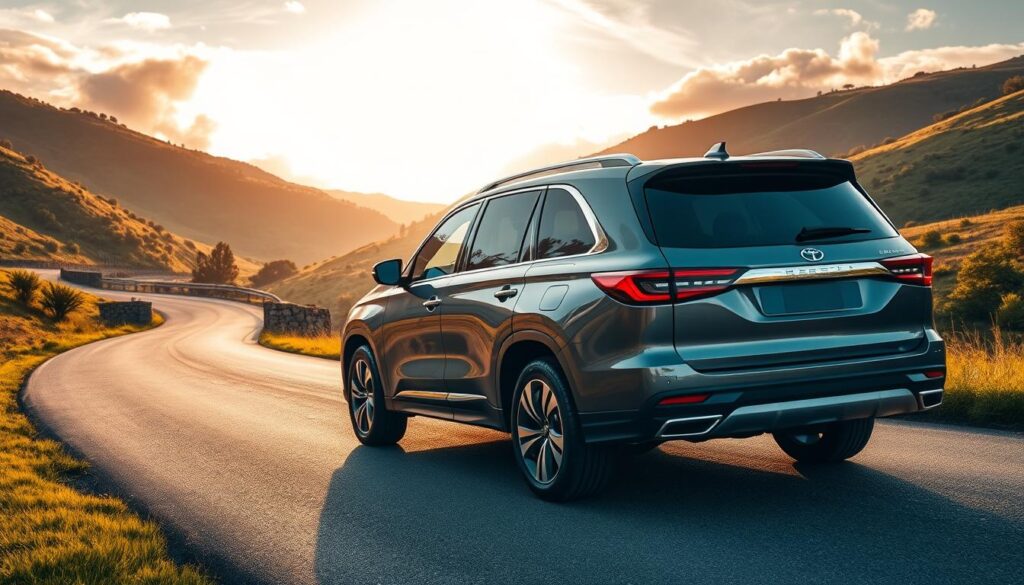
When investing in a luxury SUV, understanding the reliability and ownership experience is crucial for making an informed decision. The luxury SUV market offers a wide range of options, but not all vehicles are created equal when it comes to reliability and long-term satisfaction.
We’ve analyzed various factors that contribute to a positive ownership experience, including reliability rankings, warranty coverage, and long-term value retention. These elements are essential in determining which luxury SUVs offer the best overall value and satisfaction over time.
Most Reliable Luxury SUV Models
Reliability is a top concern for luxury SUV buyers. According to our analysis, certain models stand out for their reliability. While specific rankings can vary from year to year, some brands consistently perform better than others in reliability surveys.
- Models from manufacturers like Lexus and Toyota tend to score high in reliability surveys.
- Some European luxury brands have made significant improvements in reliability in recent years.
- Proper maintenance is key to ensuring the reliability of any vehicle.
Warranty Coverage Comparison
Warranty coverage is an important aspect of the ownership experience, providing peace of mind and protection against unexpected repair costs. Luxury SUV manufacturers offer varying levels of warranty coverage.
| Manufacturer | Basic Warranty | Powertrain Warranty |
|---|---|---|
| BMW | 4 years/50,000 miles | 4 years/50,000 miles |
| Mercedes-Benz | 4 years/50,000 miles | 4 years/50,000 miles |
| Lexus | 4 years/50,000 miles | 6 years/70,000 miles |
Long-term Value and Depreciation Rates
Depreciation is a significant factor in the total cost of owning a luxury SUV. Some models retain their value better than others. According to our latest depreciation data, the Range Rover Sport is one of the most rock-solid investments, retaining 71.6% of its original value after three years and 36,000 miles.
Other models, such as the regular Range Rover and the Porsche Cayenne, also demonstrate strong residual value, keeping more than 53% of their original price over the same period. Factors such as miles driven, condition, and service history significantly impact an individual vehicle‘s depreciation rate.
By considering these factors and choosing a model with a strong reputation for reliability and residual value, luxury SUV buyers can enjoy a more satisfying ownership experience and lower overall costs of ownership.
Best Value Luxury SUVs for 2023
The luxury SUV market in 2023 offers a range of options that balance high-end features with smart value propositions. As we analyze the current landscape, it becomes evident that certain models stand out not just for their luxury features but also for their ability to retain value over time.
When considering the best value luxury SUVs, factors such as initial purchase price, depreciation rate, and overall ownership experience come into play. Our analysis has identified key models that excel in these areas, providing buyers with a comprehensive understanding of what to expect.
Top Picks Under $50,000
In the under $50,000 category, several luxury SUVs offer compelling value propositions. These vehicles not only provide premium features but also demonstrate strong resale values.
For instance, the Porsche Macan is a standout in this category. Not only does it offer a luxurious interior and robust performance, but it also retains a significant portion of its value over time. According to our data, certain configurations of the Porsche Macan can retain up to 55% of their original value after three years.
Another model worth considering is the Audi Q5. With its comfortable ride, advanced technology features, and strong resale value, it represents a solid choice for those looking for a luxury SUV without breaking the bank.
| Model | Starting Price | Resale Value After 3 Years |
|---|---|---|
| Porsche Macan | $43,095 | 55% |
| Audi Q5 | $43,695 | 52% |
Mid-Range Models with Exceptional Value
Moving into the mid-range, luxury SUVs between $50,000 and $75,000 offer a blend of performance, luxury, and technology. The Range Rover Sport is a prime example, known for its off-road capability and luxurious interior.
Our analysis shows that the Range Rover Sport, particularly in its 3.0 P460e Autobiography form, retains an impressive 71.6% of its original value after three years. This makes it one of the most valuable luxury SUVs in its class.
“The Range Rover Sport is a testament to the brand’s commitment to luxury and performance, offering an unparalleled driving experience.”
Other models in this range, such as the BMW X5, also offer strong value propositions, with resale values ranging from 50% to over 60% after three years, depending on the configuration.
Premium Options with Strong Resale Value
For those willing to invest in the premium segment, models like the Range Rover and Porsche Cayenne offer not only exceptional performance and luxury but also strong resale values.
The Range Rover, for example, retains more than 53% of its value over three years, making it a sound investment for those who plan to keep their vehicle long-term.
In conclusion, when looking for the best value luxury SUVs in 2023, it’s essential to consider not just the initial purchase price but also the long-term value retention and overall ownership experience. Models like the Porsche Macan, Range Rover Sport, and others mentioned offer a compelling blend of luxury, performance, and value.
How to Test Drive and Evaluate a Luxury SUV
The test drive experience is pivotal in evaluating luxury SUVs, offering firsthand insight into their performance, comfort, and features. When you’re in the market for a luxury SUV, it’s not just about checking boxes off a list; it’s about experiencing how the vehicle feels on the road and whether it meets your expectations.
Essential Features to Test During Your Drive
During your test drive, there are several key features to focus on. First, assess the infotainment system and its user interface. Try navigating through menus, pairing your phone, and using voice commands to gauge its intuitiveness and responsiveness.
- Check the clarity and responsiveness of the touchscreen.
- Evaluate the sound quality of the audio system.
- Test the voice recognition capabilities.
Additionally, explore the vehicle’s comfort features, such as seat adjustability, legroom, and cargo space. Bringing along items you regularly transport can help verify if they fit comfortably in the vehicle you’re considering.
Evaluating Comfort and Performance
Comfort and performance are crucial aspects of any luxury SUV. Pay attention to how the vehicle handles on different types of roads. Notice the suspension system’s ability to absorb bumps and the overall ride quality.
- Assess the vehicle’s acceleration and responsiveness.
- Evaluate the braking performance and whether it feels smooth and controlled.
- Consider the driving position and visibility from the driver’s seat.
The driving experience varies significantly between brands, with each manufacturer having a distinct philosophy about how a luxury SUV should feel and respond. This makes test driving not just about checking if the vehicle works, but about understanding if it aligns with your driving preferences.
Comparing Multiple Models Effectively
When comparing multiple luxury SUV models, a structured approach is recommended. Back-to-back testing on the same day over similar routes allows for direct experience contrasts. Creating a scorecard with your priority categories can help maintain objectivity.
- Standardize your evaluation criteria to compare features like infotainment systems directly.
- Consider extended test drives if possible, as they provide more valuable insights than quick loops around a dealership.
- Take notes during or immediately after each test drive to remember your impressions.
By following these steps, you can make a more informed decision that aligns with your needs and preferences, ensuring that your new luxury SUV is everything you expected it to be.
Financing Options and Ownership Costs
The financial implications of owning a luxury SUV extend far beyond the initial purchase, involving various costs that need careful consideration. When evaluating the total cost of ownership, several key factors come into play, including financing options, insurance, and maintenance expenses.
Buying vs. Leasing Luxury SUVs
When it comes to acquiring a luxury SUV, buyers have two primary options: buying or leasing. Buying involves paying the full purchase price, either upfront or through financing, and retaining ownership of the vehicle. Leasing, on the other hand, allows for the use of the vehicle for a set period (usually 2-3 years) in exchange for monthly payments.
Leasing can offer several advantages, including lower monthly payments and the ability to drive a new vehicle every few years. However, it also comes with mileage limitations and wear-and-tear fees. Buying, while often requiring higher monthly payments, provides long-term ownership and the potential for long-term savings.
| Consideration | Buying | Leasing |
|---|---|---|
| Monthly Payments | Higher | Lower |
| Ownership | Yes | No |
| Mileage Limitations | No | Yes |
Insurance Considerations for Luxury Vehicles
Insurance for luxury SUVs can be significantly more expensive than for non-luxury vehicles, due to higher replacement costs and potentially higher repair costs. Factors influencing insurance costs include the vehicle’s make and model, driver’s history, and location.
To mitigate these costs, luxury SUV owners can consider options such as usage-based insurance, which can offer discounts for safe driving habits. Additionally, bundling insurance policies or increasing deductibles can also help reduce premiums.
Maintenance Costs and Service Plans
Maintenance costs for luxury SUVs can vary significantly based on factors such as the vehicle’s complexity, brand, and model year. Our analysis has shown that ultra-luxury and performance models often require service that costs 2-3 times that of entry-level luxury SUVs.
Service intervals and prepaid maintenance plans also play a crucial role in managing maintenance costs. Some manufacturers offer prepaid plans that can provide savings and predictability, though their value proposition varies between brands.
- Maintenance costs correlate with vehicle complexity and original purchase price.
- Service intervals vary between manufacturers, impacting annual costs.
- Prepaid maintenance plans can offer savings and predictability.
By understanding these factors and carefully evaluating financing options, insurance considerations, and maintenance costs, luxury SUV owners can better manage their total cost of ownership and enjoy their vehicle with greater financial peace of mind.
Conclusion: Making Your Luxury SUV Decision
After exploring the various facets of luxury SUVs, from performance to value, you’re now poised to find your ideal vehicle. We’ve provided a comprehensive overview of the luxury SUV landscape to help you navigate this complex market and find the perfect vehicle for your needs and preferences.
The best luxury SUV for you depends on your personal priorities – whether you value performance, comfort, technology, or prestige most heavily will guide your optimal choice. Value in the luxury SUV segment is relative, with some buyers prioritizing initial affordability while others focus on long-term ownership costs or exceptional experiences in specific areas.
We recommend creating a personalized shortlist based on your must-have features, budget constraints, and preferred driving characteristics rather than focusing solely on brand prestige. The luxury SUV market continues to evolve rapidly, with electrification, autonomous capabilities, and digital integration reshaping what defines premium transportation.
For personalized assistance with your luxury SUV search, we’re available to answer specific questions and provide tailored recommendations via WhatsApp at +44-7822010953. Our team is dedicated to helping you find the best luxury vehicle that meets your unique requirements.
The ultimate luxury SUV decision should balance objective factors like features and specifications with the subjective emotional connection you feel during the test drive – the best choice is the one that excites you every time you approach it. As you make your decision, consider how a responsive web design can enhance your overall experience, whether it’s for researching your next vehicle or enjoying the digital features within your new luxury SUV.
In conclusion, finding the right luxury SUV is a personal journey that requires careful consideration of your priorities and preferences. We’re confident that our comprehensive guide has provided you with the insights needed to make an informed decision and enjoy the exceptional experience that comes with owning a premium vehicle.
